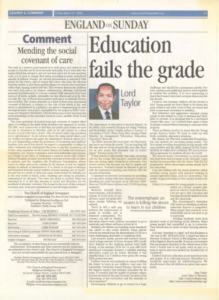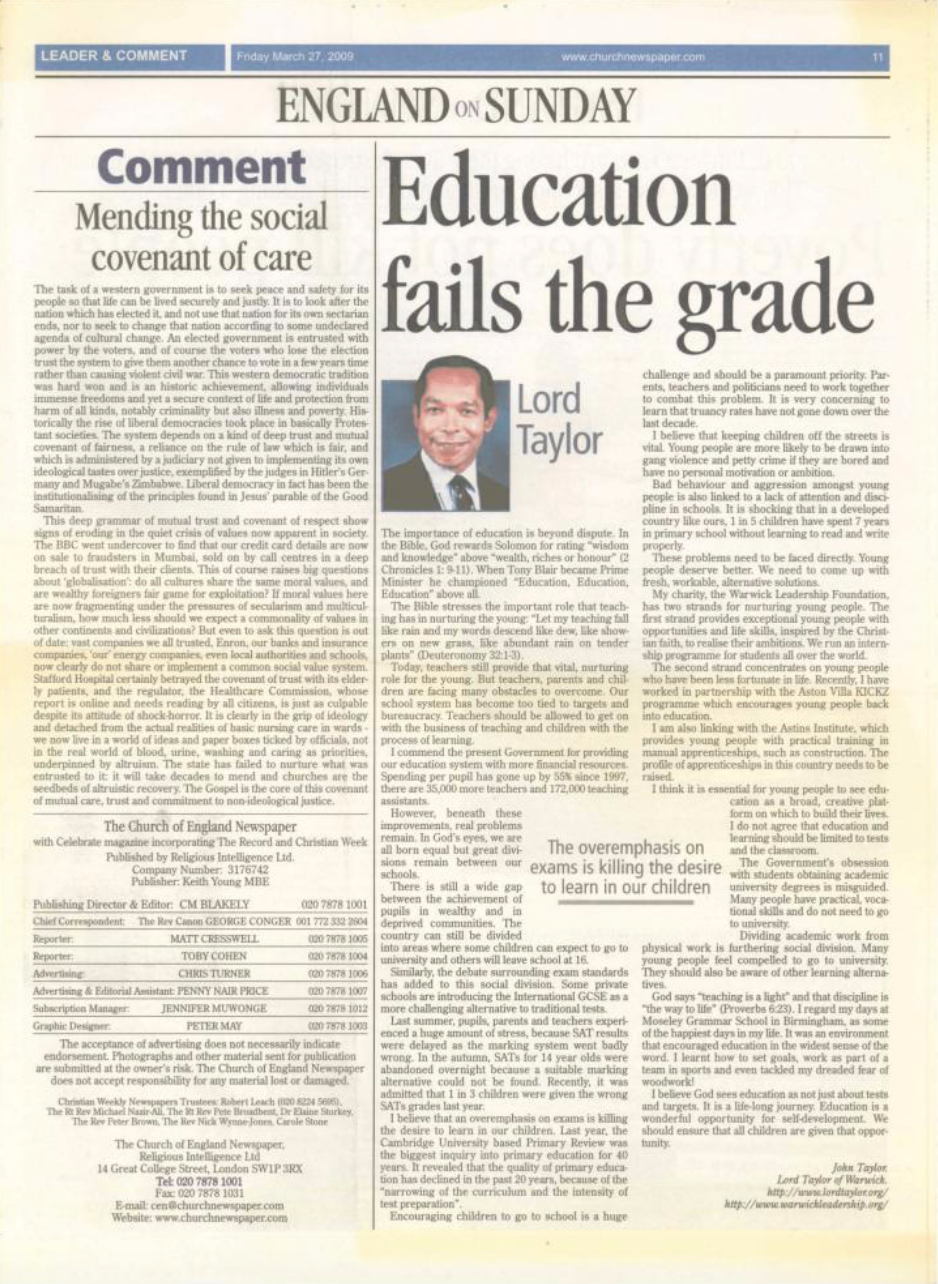Church of England Article By Lord Taylor of Warwick
 The importance of education is beyond dispute. In the Bible, God rewards Solomon for rating “wisdom and knowledge” above “wealth, riches or honour” (2 Chronicles 1: 9-11). When Tony Blair became Prime Minister he championed “Education, Education, Education” above all.
The importance of education is beyond dispute. In the Bible, God rewards Solomon for rating “wisdom and knowledge” above “wealth, riches or honour” (2 Chronicles 1: 9-11). When Tony Blair became Prime Minister he championed “Education, Education, Education” above all.
The Bible stresses the important role that teaching has in nurturing the young: “let my teaching fall like rain and my words descend like dew, like showers on new grass, like abundant rain on tender plants” (Deuteronomy 32:1-3).
Today, teachers still provide that vital, nurturing role for the young. But teachers, parents and children are facing many obstacles to overcome. Our school system has become too tied to targets and bureaucracy. Teachers should be allowed to get on with the business of teaching and children with the process of learning.
I commend the present Government for providing our education system with more financial resources. Spending per pupil has gone up by 55% since 1997, there are 35,000 more teachers and 172,000 teaching assistants.
However, beneath these improvements, real problems remain. In God’s eyes, we are all born equal but great divisions remain between our schools.
There is still a wide gap between the achievement of pupils in wealthy and in deprived communities. The country can still be divided into areas where some children can expect to go to university and others will leave school at 16.
Similarly, the debate surrounding exam standards has added to this social division. Some private schools are introducing the International GCSE as a more challenging alternative to traditional tests.
Last summer, pupils, parents and teachers experienced a huge amount of stress, because SAT results were delayed as the marking system went badly wrong. In the autumn, SATs for 14 year olds were abandoned overnight because a suitable marking alternative could not be found. Recently, it was admitted that 1 in 3 children were given the wrong SATs grades last year.
I believe that an overemphasis on exams is killing the desire to learn in our children. Last year, the Cambridge University based Primary Review was the biggest inquiry into primary education for 40 years. It revealed that the quality of primary education has declined in the past 20 years, because of the “narrowing of the curriculum and the intensity of test preparation”.
Encouraging children to go to school is a huge challenge and should be a paramount priority. Parents, teachers and politicians need to work together to combat this problem. It is very concerning to learn that truancy rates have not gone down over the last decade.
I believe that keeping children off the streets is vital. Young people are more likely to be drawn into gang violence and petty crime if they are bored and have no personal motivation or ambition.
Bad behaviour and aggression amongst young people is also linked to a lack of attention and discipline in schools. It is shocking that in a developed country like ours, 1 in 5 children have spent 7 years in primary school without learning to read and write properly.
These problems need to be faced directly. Young people deserve better. We need to come up with fresh, workable, alternative solutions.
My charity, the Warwick Leadership Foundation, has two strands for nurturing young people. The first strand provides exceptional young people with opportunities and life skills, inspired by the Christian faith, to realise their ambitions. We run an internship programme for students all over the world.
The second strand concentrates on young people who have been less fortunate in life. Recently, I have worked in partnership with the Aston Villa KICKZ programme which encourages young people back into education.
I am also linking with the Astins Institute, which provides young people with practical training in manual apprenticeships, such as construction. The profile of apprenticeships in this country needs to be raised.
I think it is essential for young people to see education as a broad, creative platform on which to build their lives. l do not agree that education and learning should be limited to tests and the classroom.
The Government’s obsession with students obtaining academic university degrees is misguided. Many people have practical, vocational skills and do not need to go to university.
Dividing academic work from physical work is furthering social division. Many young people feel compelled to go to university They should also be aware of other learning alternatives.
God says “teaching is a light” and that discipline is “the way to life” (Proverbs 6:23). I regard my days at Moseley Grammar School in Birmingham, as some of the happiest days in my life. It was an environment that encouraged education in the widest sense of the word. I learned how to set goals, work as part of a team in sports and even tackled my dreaded fear of woodwork!
I believe God sees education as not just about tests and targets. It is a life-long journey. Education is a wonderful opportunity for self-development We should ensure that all children are given that opportunity.
